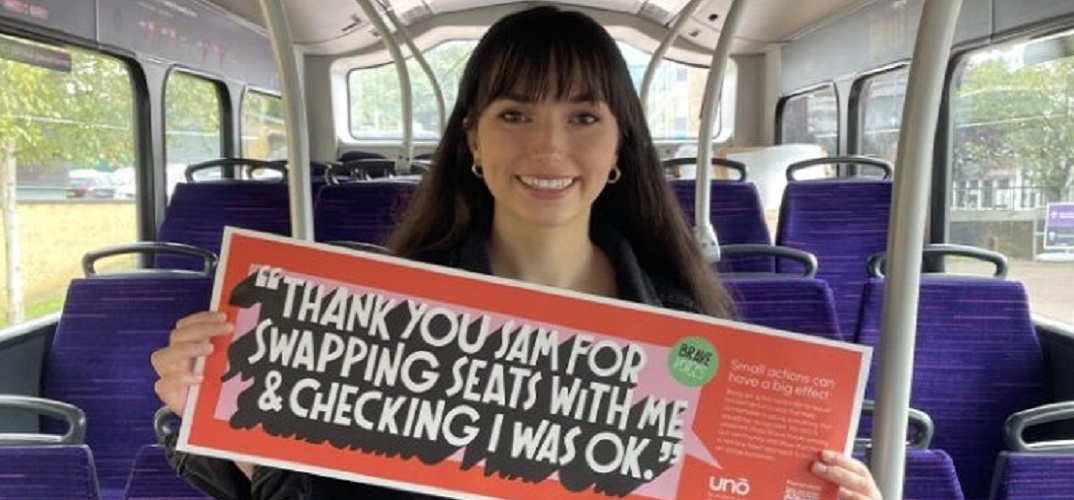Meet the Herts graduate campaigning against harassment on public transport - by telling bystanders what they can do to help

According to a 2020 report by the Equalities Office, more than a quarter of people in the UK who experience sexual harassment, experienced it on public transport. But of those surveyed, only a third of victims overall said they had formally reported it.
Shocking statistics like these grabbed the attention of graphic designer Anne-Marie Leadbetter during her time studying at the University of Hertfordshire. Having researched harassment on the London Underground in her final year, the Herts graduate is now leading a campaign for the University-owned bus service Uno, which aims to tackle the issue. Thankfully, incidents on Uno buses are rare. But Anne-Marie hopes the ‘Brave Voices’ campaign will encourage commuters to report their experiences if they do happen and let bystanders know that even small interventions can make a big difference.
Following a successful launch earlier this month, we spoke to her about what positive things people can do if they witness unwanted behaviours.
What is the Brave Voices campaign?
“It’s a creative campaign which aims to highlight the impact of harassment for passengers on public transport. Artwork, designed by me, will be displayed on Uno’s fleet of buses, and will contain information encouraging people in the community to act against inappropriate behaviours.”
How did you come to be involved?
“The Brave Voices campaign started the year I left University. I always had a passion for the topic, having done a project in my last year at Herts into sexual harassment on the London Underground. After I graduated, I still wanted to use my work to explore this topic and make an impact – and I found that opportunity through Uno. They really took to the idea and were keen to get a campaign rolled out. Leading the creative design and overall concept, I knew I wanted the campaign to be empowering. I didn’t want to focus on the negatives too much, or for it to be too statistic-heavy. Instead, I wanted it to be quite positive, reminding people they are part of a community and can take action together as a result.”
So, how does it work?
“Each poster has a QR code you can scan if you feel you or a fellow passenger needs help. It’ll take you to a webpage which will let you know what you can do right then and there – whether that is reporting an incident that’s happened or supporting someone in difficulty. Some of the interventions are really small, but they can have a massive impact in helping to de-escalate a situation. The webpage also links to other resources, like the UK government’s Just Think Stop campaign, which has lots more advice on how people can help without putting themselves in a risky situation.
“Generally, the campaign also aims to spread awareness about the issue. A lot of people don’t know too much about the topic and I think it’s a good thing to have information all in one place, so that people can learn more and feel encouraged and empowered to act.”
What are some little steps people can take?
“It’s not a one-size-fits-all method, as each situation is different. But firstly, if you’re on a bus and need assistance, you can tell the bus driver. If you see someone else who needs help, you can also subtly intervene. This could be as simple as asking the person needing help where the bus stops next, as it interrupts what’s happening and gives them a chance to move away. You could also ask them if they’d like to swap seats, or even just ask if they are okay. Uno is encouraging people to report incidents to them if they do happen, so they can investigate it.
“However, if you feel like the situation could escalate and there’s a risk of violence then you should call 999, as well as letting the bus driver know.”
Why is positive campaigning so important?
“Sometimes, campaigns around this issue can inadvertently be quite triggering. It’s hard not to focus on the negatives, but if you focus too much on the downside, or even on the statistics, it can actually end up discouraging people from speaking out. For example, a lot of people don’t report incidents because they don’t see the point – they don’t see the really positive impact they can have. If we show them that immediate good will come out of their actions, then they are more likely to help someone out. I want to get more people to report and to recognise that they’re not alone.”
What impact would you like the campaign to have?
“The issue of sexual harassment on public transport is UK-wide issue, but I think the one of the main goals for Uno’s campaign is to get people to look out for each other a bit more. The campaign is very personal to me, as I used my own experiences and the experiences of my friends to reach people – I wanted it to feel human and personal. If we can help improve peoples’ personal experiences of public transport, then it’ll have been a job worth doing.”
You can read more about the campaign on Uno buses’ Brave Voices information webpage. The University also provides its own support for victims of sexual assault, harassment or violence. Visit AskHerts for details on how to access these services, which include free counselling, advice, a 24/7 helpline and assistance in accessing external avenues of support.